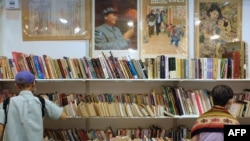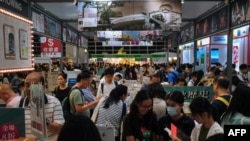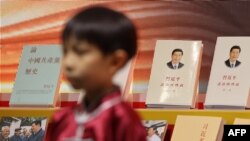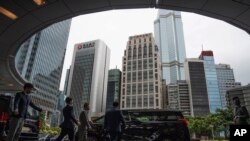An invitation from Hong Kong authorities for citizens to report public library books that “endanger national security” has sent chills through the port city, analysts and some residents say. Some worry authorities are adopting tactics similar to those used in China and during the Cultural Revolution, others say the move will only further harm the city’s already tarnished image as a place that’s no longer free.
In 2021, Hong Kong Public Libraries (HKPL) began reviewing books for potential breaches of the national security law (NSL) imposed by Beijing in 2020 to restore order in the city, which was rocked by weeks of sometimes violent protests in 2019 against a proposed, then rescinded, extradition bill that would have allowed suspects to be sent to China for trial.
In April, the government announced the library system had completed a preliminary review of its extensive collection, which has more than 15 million books and other items.
No data was provided on how many books had been removed, but hundreds of titles are reported to have been gotten rid of according to Hong Kong’s Ming Pao newspaper, which has been tracking the purge.
In July, the government took the campaign one step further by inviting library users to help rid shelves of books violating the security law and setting up new channels for such reporting, including through emails and online or paper forms.
The law penalizes secession, subversion, terrorism and collusion with foreign forces, with penalties as severe as life imprisonment.
Chen Daoyin, a political scientist formerly with the Shanghai University of Political Science and Law who now lives abroad, says the move shows how Hong Kong is learning from China.
China “recently passed an anti-spying law. It encourages children to report on parents; pedestrians, teachers, students and spouses to report on each other; and passengers to report on taxi drivers,” Chen said. “It’s going back to the Cultural Revolution days.”
China’s Cultural Revolution was a period of tremendous social upheaval that turned friends, families, colleagues and neighbors against one another.
Chen said the call for public help could be a sign Beijing is not confident the book purge has been carried out comprehensively.
“The government entities might go along with the policy, but individuals (who work there) might not cooperate, so that’s why they want people to report,” he told VOA in a telephone interview.
A search this week through catalogs on HKPL’s website found no results for works by some pro-democracy activists and lawmakers, works by a satirical cartoonist or books about Hong Kong’s anti-extradition law protests and only two results about the June 4, 1989, crackdown on demonstrators on Tiananmen Square in Beijing.
But bookshelves at one big library this reporter visited still contained books that could be considered by Beijing to be problematic as they promote political reform in China. They were placed in obscure places.
“It’s a weak people’s way of rebelling – by not abiding. Hong Kong people are used to freedoms, they will naturally not obey, albeit in small ways,” Chen said.
The Leisure and Cultural Services Department, which runs Hong Kong’s 71 libraries and 12 others that are mobile, would not answer VOA’s questions on how many reports have been made by the public since the channels were set up.
It did provide a written response.
“Freedom of speech and publication is protected under the Basic Law [Hong Kong’s mini constitution] .. it is the Government’s duty and responsibility to safeguard national security and effectively prevent any act or activity endangering national security, as well as to promote positive values and desirable notions,” the response said.
“Therefore,” it continued, “the Government shall ensure that all public library materials are in full compliance with the laws of Hong Kong, not contrary to the interests of national security, and serve the interests of Hong Kong.”
Library patrons interviewed this week said they will not use the channels.
“Absolutely not!” said one woman who is from China who and has lived in Hong Kong for two decades. “There should be freedom of expression, including through books. Otherwise, we hear only one perspective.”
Like other interviewees, she refused to be named for fear of retribution.
“Different people’s voices should be heard. Of course, some could be jarring noise to you, but that’s natural. Even in a jungle, you hear different voices. Crows might not sound nice, but even they need to yell. You can’t forbid it from talking,” she said.
A young man said he no longer goes to the library or even large bookstores for “sensitive books.” Instead, he gets them from small, independently run shops.
“This is of course not good. If you don’t have these books, then how can you say you’re a free society?” he asked.
He lamented that even cooking, travel and nonpolitical books written by democracy advocates have been removed. A look in the catalog, however, showed some such books were still there, suggesting the process of review may be fluid and ongoing.
An elderly man who brought his granddaughter, relative and her friend visiting from China to the Central Library said he was not worried about the book purge or the security law.
“Things are much better now than in 2019 when it was so dangerous that I didn’t dare to go out,” he said. “Hong Kong is a lot freer than the mainland. As long as you don’t violate the law, there’s no problem with freedom of expression. If the government is wrong, I also criticize it.”
His relative from China, a recent high school graduate, however, knew nothing of the 1989 protests in Tiananmen Square or the June 4 crackdown, in which hundreds and perhaps thousands of protesters were killed by troops.
“June 4? What is that? Did it happen during the Cultural Revolution?” she asked.
A Hong Kong mother, rushing off with her child, said she was not worried that having fewer books in the library, meant her child would grow up not knowing history.
“Parents can supplement their children’s knowledge,” she said.
However, Chen, the political scientist, said the same knowledge gaps seen among mainlanders will likely occur in Hong Kong if the current trend continues.
“Hong Kong will become more mainlandized. … In the mainland, those born after 1990 don’t know about June 4. Hong Kong will definitely become like this,” he said.
Asked why Beijing and Hong Kong’s governments are employing such tactics even though the city has been calm in the past three years and even as they try to rebuild its image as an Asian financial and tourism center, Chen said it was insecurity following the widespread and disruptive protests in 2019.
“Any blowing of the wind and movement of the grass will make them feel insecure,” he said. “This won’t pass. The overseas Hong Kong activists will do something, then Hong Kong’s government will step up its controls, and the activists will step up their actions. It’s a cycle.”








